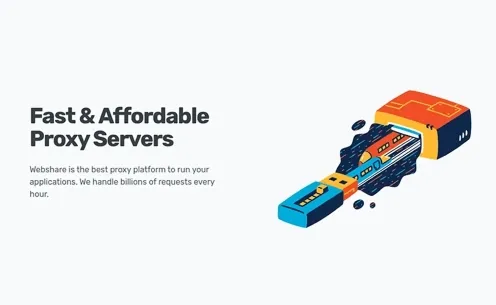
Proxy vs. VPN vs. Antidetect Browser
You want to stay anonymous online, but with so many privacy tools, it’s easy to get lost. Some wear by proxies. Others trust VPNs. And then there’s another breed: antidetect browsers, built to outsmart the most advanced tracking systems. Each tool offers a different kind of protection - IP masking, encryption, fingerprint spoofing - but also comes with trade-offs in speed, cost, and complexity. So which one fits your real-world needs? In this guide, we unpack the tech, use cases, and insider tips from power users to help you choose smarter and stay truly invisible.
Proxies
Over time, as the internet became more restricted and surveillance tools became more prevalent, proxies began to be used to bypass blocks, change IP addresses, and support automation tools. Today, they are used everywhere, from reselling trainers and data parsing to corporate information gathering systems.
Functionality and use cases
A proxy is a server that stands between your device and the internet. Instead of your traffic going directly to a website, it passes through the proxy first, which sends the request using its own IP address. This switch hides your real location. Technically, proxies rely on two core protocols: HTTP, used for browsing websites, and SOCKS, which supports nearly any kind of internet traffic. These protocols define how data is packaged and transferred and the proxy reshapes that flow so it looks like it came from a different source.
Proxies are essential in industries that rely on data at scale. SEO teams use them to track search results from different locations without bias. E-commerce platforms monitor global pricing and stock levels using proxy pools. Advertisers run multi-account campaigns across regions, avoiding bans from strict anti-fraud systems. Researchers scrape massive datasets without hitting rate limits. Even sneaker resellers and ticket scalpers rely on proxies to bypass purchase restrictions. Wherever location, volume, or identity needs masking, proxies are the silent engine behind the scenes.
Advantages and limitations
Fast, modular, and easy to scale, proxies are built for performance. They let you switch IPs per request, simulate access from any region, and avoid full-network rerouting. For scraping, automation, or ad tracking, this means speed without friction. Residential proxies add realism, datacenter ones add volume. And because proxies work at the application level, they slot into tools and scripts with minimal setup, offering targeted control without the bulk of a VPN or browser.
There are two main protocols: HTTP and HTTPS (which differs in terms of traffic encryption) for standard web surfing, and SOCKS, which is universal and suitable for almost any type of internet traffic. This usually refers to the SOCKS5 version. These protocols set the rules for data transfer, and the proxy changes the flow so that it looks like the request came from a different source.
In the proxy vs antidetect browser comparison, proxies help with IP rotation, but antidetect browsers also protect against fingerprinting and browser-based tracking. Even premium proxies can get flagged if reused or poorly rotated. That’s why relying on them alone often leads to bans, broken sessions, or wasted spend. In modern use cases, proxies are best seen as one layer, not the whole shield.
VPNs
VPNs showed up as the next step after proxies. Not just to hide your IP, but to protect everything you do online. They started as tools for companies to give employees safe remote access, but quickly became popular with everyday users. Unlike proxies, VPNs encrypt all your traffic, not just what goes through the browser. That’s why they’re great for working on public Wi-Fi, streaming from other countries, or staying private on any connection. As internet risks grew, VPNs became the go-to for easy, full-device protection that works in just one click.
How they work
A VPN establishes an encrypted tunnel between you and an intermediate server. This means that your connection to the network looks like this: your PC, then the intermediate server, and only then the internet. All your online activity goes through this server with a different IP address, meaning that websites see the server's IP address instead of yours.
Benefits and drawbacks
VPNs offer a strong balance of privacy and usability. They encrypt all traffic between your device and the internet, protecting your data from ISPs, hackers, or anyone on public Wi-Fi. Because they work at the system level, VPNs cover every app, not just the browser. Setup is usually one click, with no technical skills needed. Many providers offer extras like malware protection or multi-hop routing. This makes VPNs a solid option for secure browsing, remote work, and avoiding location-based restrictions.
In tasks such as parsing, automation, or ad tracking, this ensures high speed without excessive load and delays. Resident proxies add realism, while data centre proxies offer high bandwidth, allowing you to work with large amounts of data. Since they operate at the application level, they are easy to integrate into scripts and tools, with minimal configuration and maximum control.
Antidetect Browsers
When websites started identifying users by how their browser looked and behaved, not just where they were connecting from - the game changed. Antidetect browsers were built to respond. They don’t just hide your IP like proxies or encrypt traffic like VPNs, but shape an entire browser identity. Linken Sphere was one of the earliest solutions tailored for this task.
Unique features
Most anonymity tools try to erase your tracks. Antidetect browsers take a different route - they create a believable identity from the start. Each profile mimics a real device, with custom screen sizes, fonts, languages, time zones, and more. This makes them ideal for managing multiple accounts, testing web behavior, or bypassing detection systems that flag bots or duplicates. Linken Sphere refines this approach with hybrid fingerprinting that mixes real and synthetic signals for natural randomness. Profiles are fully isolated and encrypted in the cloud, making them accessible across devices. With no data leaks to date, it’s a trusted choice for high-stakes, high-scale workflows.
Pros
Antidetect browsers give you full control over how your browser looks to the web: from screen size and time zone to OS and device details. That makes them great for managing many accounts at once, without overlap or tracking issues. You can create multiple profiles, link them to different proxies, and run them in parallel. Some browsers including Linken Sphere also support encrypted profile storage and cloud access, so you can switch devices without losing setup. For affiliate marketing, automation, and traffic ops, this level of control can be a real advantage.
Cons
Getting started takes more effort than with a VPN or proxy. To avoid detection, each profile needs to look consistent and setting that up takes some technical know-how. The interface in some tools can feel complex, especially for new users. Also, plans with full features cost more than basic tools, and some platforms still associate these browsers with gray-market use. For serious tasks, they're worth it, but you need to know what you’re doing.
Comparison Table: Proxy vs VPN vs Antidetect Browser
We’ve put together a quick guide to help you navigate the world of proxies, VPNs, and antidetect browsers. This table shows which tool covers which function, so you don’t overpay, overlap, or overlook a critical gap.
Proxy | VPN | Antidetect Browser | |
Cost | Very cheap and easy to scale | Moderate cost with monthly plans | Starts around $30 |
IP Anonymity | Hides IP but it may be shared or flagged | Hides IP but VPN IPs are often blocked | Each profile has a unique IP |
Traffic Encryption | No encryption so only HTTPS protects data | Fully encrypts traffic to the VPN server | No built-in encryption; relies on external proxy or tunnel |
Device Coverage | Works per app and needs setup in each tool | Covers all apps once connected | Covers only browser traffic; some offer mobile apps or emulation |
Fingerprinting | Does not change device fingerprint | Does not change fingerprints and tracking is possible | Hides or fakes the full fingerprint |
Ease of Use | Easy to get started and simple to integrate into workflows.
| Very easy with one click setup | Requires initial setup and some learning curves |
Performance | Fast if the proxy is good but can be unstable | Slower due to encryption overhead | Medium performance; multiple profiles increase RAM/CPU load |
Scalability | Scales well with access to many IPs | Poor scaling with one IP per session | Built to scale and supports hundreds of profiles |
Typical Use Cases | Scraping, IP switching, and geo access | Safe browsing, public Wi-Fi, and streaming | Multi-account tasks, ads, automation, and spoofing |
Which Tool Should You Use?
For affiliate marketing or arbitrage
Managing ad accounts often means juggling identities. Most platforms track more than location, so privacy tools help keep campaigns separate. VPN can mask where you log in from. Proxies help rotate connections. Antidetect browsers give each account its own digital fingerprint. Used together, they reduce bans and improve account survival.
For scraping / data collection
Collecting data from websites can trigger blocks if done carelessly. VPN might be enough for low-risk tasks. Proxies offer rotating access to avoid IP bans. When pages require logins or mimic real users, antidetect browsers make scripts harder to detect. Each tool helps reduce friction depending on the site’s defenses.
For personal use
Everyday privacy tools work best when matched to habits. VPNs are simple and widely trusted for keeping browsing secure. Proxies sometimes help with access or speed. Antidetect browsers are more complex and usually unnecessary unless you're managing multiple sessions. Most users find a VPN and some common sense fully sufficient.
Conclusion
The real question isn’t which tool to use, it’s how visible you’re willing to be. Platforms don’t just block bad actors, they profile patterns. What looks like a shortcut often leaves a trace. The smartest setups aren’t the most expensive, but the ones that stay unnoticed the longest. Mask what matters. Randomize the rest.
Frequently Asked Questions
Do I need both a VPN and an antidetect browser?
Usually not. Antidetect browsers with residential proxies already hide both your IP and fingerprint. A VPN can add system-level encryption, but for most tasks it’s unnecessary. Use both only if you need extra protection in high-risk regions or want to mask traffic before it hits the proxy.
Which is more suitable for managing multiple accounts?
Antidetect browsers. Each profile has a unique fingerprint, cookies, and IP. VPNs only change your IP, so accounts can still be linked by device data. If you need scale and separation, whether for ads, marketplaces, or SMM - use an antidetect browser with clean residential or mobile proxies.
Can I use a VPN inside an antidetect browser?
It is possible, but there is usually no need to do so. You can enable VPN at the system level and set separate proxies directly in your browser. In this case, websites will see the outgoing IP proxy, but the VPN tunnel will also be used in the connection. The final connection chain looks like this: your PC, then VPN, then proxy, and only then the internet. You can configure it this way, but the benefit is minimal, except when working under strict censorship or when you need to add an extra layer of protection.

Linken Sphere 7th anniversary

Using LS with OBS Studio
This is a comprehensive guide that will help you implement video stream substitution in Linken Sphere without the risk of detection by anti-fraud systems.

Integration guide: Webshare + Linken Sphere
In today's digital landscape, maintaining privacy and anonymity online is more important than ever. Using an anti-detect browser like Linken Sphere is a powerful step towards safeguarding your digital identity. However, to maximize its effectiveness, pairing it with high-quality proxies is crucial. In this article, we'll explore what proxies are, the benefits of using them with an anti-detect browser, and why Webshare proxies stand out as an excellent choice. Additionally, we'll provide a guide to integrating Webshare proxies with Linken Sphere to ensure seamless browsing and enhanced security.